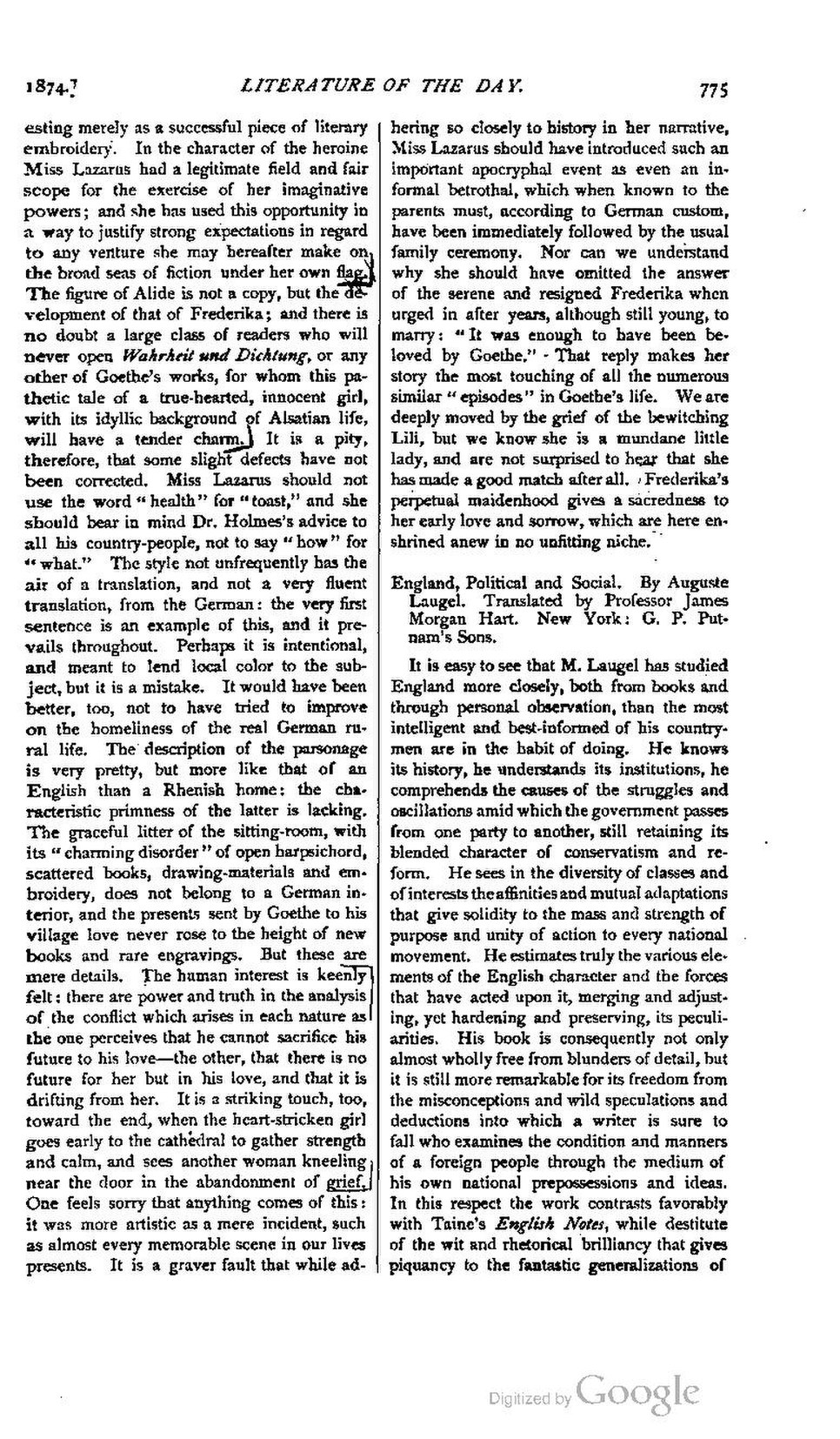esting merely as a successful piece of literary embroidery. In the character of the heroine Miss Lazarus had a legitimate field and fair scope for the exercise of her imaginative powers; and she has used this opportunity in a way to justify strong expectations in regard to any venture she may hereafter make on the broad seas of fiction under her own flag. The figure of Alide is not a copy, but the development of that of Frederika; and there is no doubt a large class of readers who will never open Wahrheit und Dichtung, or any other of Goethe's works, for whom this pathetic tale of a true-hearted, innocent girl, with its idyllic background of Alsatian life, will have a tender charm. It is a pity, therefore, that some slight defects have not been corrected. Miss Lazarus should not use the word "health" for "toast," and she should bear in mind Dr. Holmes's advice to all his country-people, not to say "how" for "what." The style not unfrequently has the air of a translation, and not a very fluent translation, from the German: the very first sentence is an example of this, and it prevails throughout. Perhaps it is intentional, and meant to lend local color to the subject, but it is a mistake. It would have been better, too, not to have tried to improve on the homeliness of the real German rural life. The description of the parsonage is very pretty, but more like that of an English than a Rhenish home: the characteristic primness of the latter is lacking. The graceful litter of the sitting-room, with its "charming disorder" of open harpsichord, scattered books, drawing-materials and embroidery, does not belong to a German interior, and the presents sent by Goethe to his village love never rose to the height of new books and rare engravings. But these are mere details. The human interest is keenly felt: there are power and truth in the analysis of the conflict which arises in each nature as the one perceives that he cannot sacrifice his future to his love—the other, that there is no future for her but in his love, and that it is drifting from her. It is a striking touch, too, toward the end, when the heart-stricken girl goes early to the cathedral to gather strength and calm, and sees another woman kneeling near the door in the abandonment of grief. One feels sorry that anything comes of this: it was more artistic as a mere incident, such as almost every memorable scene in our lives presents. It is a graver fault that while adhering so closely to history in her narrative, Miss Lazarus should have introduced such an important apocryphal event as even an informal betrothal, which when known to the parents must, according to German custom, have been immediately followed by the usual family ceremony. Nor can we understand why she should have omitted the answer of the serene and resigned Frederika when urged in after years, although still young, to marry: "It was enough to have been beloved by Goethe." That reply makes her story the most touching of all the numerous similar "episodes" in Goethe's life. We are deeply moved by the grief of the bewitching Lili, but we know she is a mundane little lady, and are not surprised to hear that she has made a good match after all. Frederika's perpetual maidenhood gives a sacredness to her early love and sorrow, which are here enshrined anew in no unfitting niche.
It is easy to see that M. Laugel has studied England more closely, both from books and through personal observation, than the most intelligent and best-informed of his countrymen are in the habit of doing. He knows its history, he understands its institutions, he comprehends the causes of the struggles and oscillations amid which the government passes from one party to another, still retaining its blended character of conservatism and reform. He sees in the diversity of classes and of interests the affinities and mutual adaptations that give solidity to the mass and strength of purpose and unity of action to every national movement. He estimates truly the various elements of the English character and the forces that have acted upon it, merging and adjusting, yet hardening and preserving, its peculiarities. His book is consequently not only almost wholly free from blunders of detail, but it is still more remarkable for its freedom from the misconceptions and wild speculations and deductions into which a writer is sure to fall who examines the condition and manners of a foreign people through the medium of his own national prepossessions and ideas. In this respect the work contrasts favorably with Taine's English Notes, while destitute of the wit and rhetorical brilliancy that gives piquancy to the fantastic generalizations of
